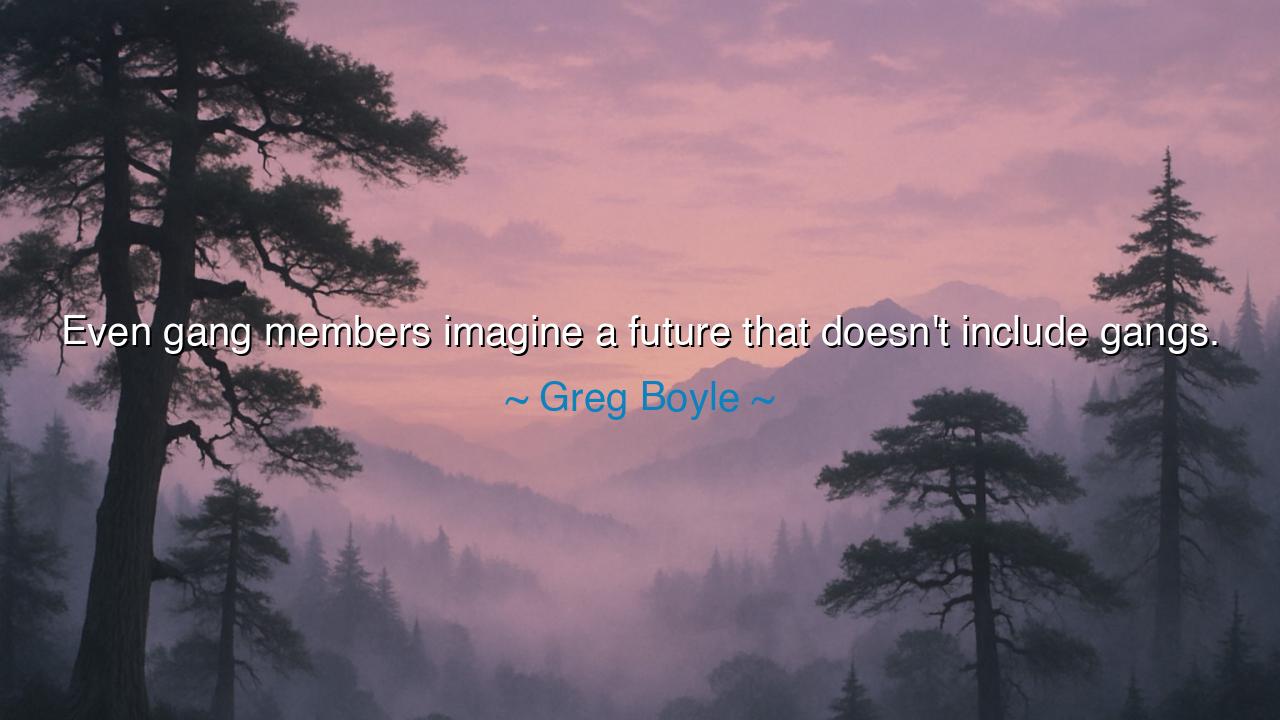
Even gang members imagine a future that doesn't include gangs.






"Even gang members imagine a future that doesn't include gangs." – Greg Boyle.
In these powerful words, Greg Boyle speaks to the inherent human capacity for transformation and hope, even in the most challenging and seemingly hopeless circumstances. His statement acknowledges the desire for change, even among those whose lives are entrenched in violence and despair. Gang members, often seen by society as lost to a life of crime, still harbor visions of a different future, a future where they are free from the chains of their past. Boyle’s words remind us that redemption is not confined to a select few but is a universal possibility for all who seek it.
The ancient Greeks believed in the concept of potential—the idea that every individual, no matter their station in life, possessed the ability to change and achieve greatness. Aristotle, in his Nicomachean Ethics, wrote of virtue as something to be cultivated through deliberate effort, suggesting that no person is bound to their past actions. The same can be said for Boyle’s message: no one is bound by their circumstances if they are willing to imagine a different future. Just as Aristotle believed that a man could rise above his flawed nature through habit and reflection, Boyle suggests that the gang member can rise above his environment through imagination and hope.
The story of Nelson Mandela offers a profound example of the power of imagination in shaping one’s future. Imprisoned for 27 years, Mandela could have easily resigned himself to the belief that his life was defined by his imprisonment and the injustices of apartheid. However, in the darkest of times, he never stopped imagining a future of equality and freedom for his people. Mandela’s vision of a peaceful, democratic South Africa was not merely an abstract ideal; it was a future he imagined and then worked toward, no matter how improbable it seemed. Boyle’s words echo Mandela’s spirit—when we can imagine a different future, we can begin to take the steps to make it a reality.
Similarly, Gandhi’s struggle for India’s independence was rooted in a vision of a free nation, a vision he clung to even when the situation seemed insurmountable. Gandhi believed that the power of imagination—coupled with nonviolent resistance—could reshape the course of history. Like Mandela, he transformed his vision into action, showing us that the capacity to dream of a better future is often the first step toward creating that future. Boyle’s quote reflects this same truth: the ability to imagine a life beyond one’s current circumstances is the spark that can ignite profound change, not only in the individual but in society as a whole.
Boyle’s statement also speaks to the universal human need for hope. In the face of violence, poverty, and despair, hope can be a radical force for change. Even in the darkest corners of society, where gang violence and crime seem inescapable, the human spirit clings to the possibility of a better life. Boyle’s work with Homeboy Industries, which provides a path to redemption for former gang members, is a testament to this possibility. Boyle has seen firsthand how the simple act of imagining a different future can inspire transformation. He understands that hope, though fragile, can provide the strength needed to break free from a cycle of violence and self-destruction.
In our own lives, the lesson Boyle imparts is that we must never lose sight of the power of imagination. The ability to envision a future that transcends our current struggles is the very first step toward overcoming them. Whether we are facing personal challenges, societal injustice, or moments of doubt, the future is shaped by what we dare to dream. Just as Boyle speaks to the gang member’s hidden hope for something greater, we too must cultivate that vision of possibility in our own lives, no matter the obstacles we face.
The lesson here is simple yet profound: imagine the future you want to create, and act accordingly. Whether it is in our personal development, our work, or our relationships, the first step toward change is the ability to see something better on the horizon. Like the gang members who envision a life beyond the streets, we must continually nurture our own dreams and aspirations. Imagination is the seed from which action grows, and through hope, we can transform not only our own lives but the world around us. Let us embrace the truth in Boyle’s words and, like the great leaders before us, use the power of vision to create a future defined not by our past, but by our potential.






AAdministratorAdministrator
Welcome, honored guests. Please leave a comment, we will respond soon